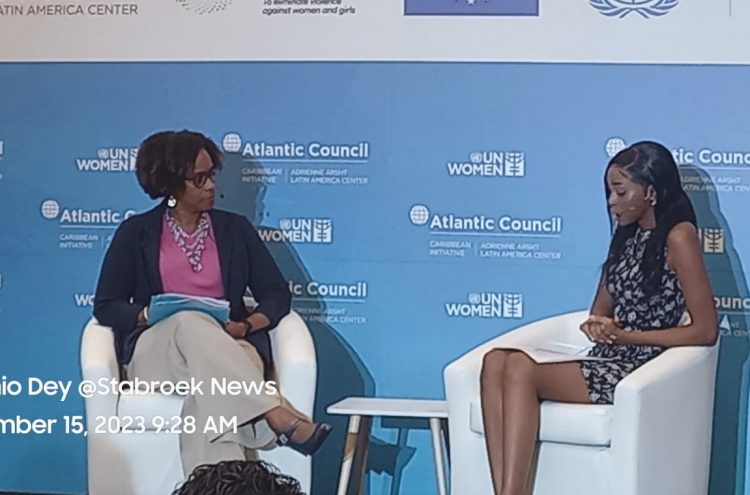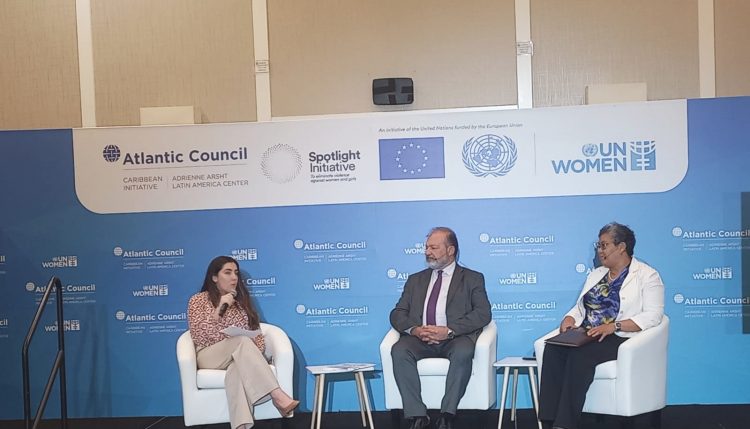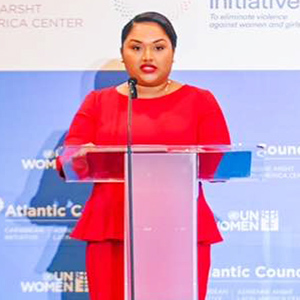With only 55% of women in the labour force compared to 78% for men, there is a dire need for females to access economic opportunities, says First Lady Arya Ali.
The First Lady was speaking yesterday at the Caribbean Gender Empowerment Forum held at the Guyana Marriott Hotel, Georgetown where she emphasized the importance of girls and women having equal access to fundamentals like education, employment and finance.
The event hosted by the Atlantic Council and UN Women Caribbean in partnership with the European Union/ United Nations Spotlight Initiative weighed in on developing strategies for gender equality and empowerment in Guyana and the region.

The First Lady said in light of Guyana’s economic growth, due to sectors like oil, women must not be excluded from these opportunities as they are already confronted by the issue of gender inequality.
According to the World Economic Forum’s Global Gender Gap Report for 2021, it will take at least 100 years to obtain gender equality.
But the First Lady is adamant that this can be changed, once there is support from both the public and private sectors.
“With our country experiencing unprecedented growth and rapid transformation, it is incumbent on us, particularly leaders and officials to ensure that our women and girls are not excluded from the opportunities which are before us”, Mrs Ali said

She added that she recently signed a contract with the Atlantic Alliance (AA) Maritime & Offshore Training School to enable 100 indigenous women to be equipped with skills to support the country’s oil and gas industry.
Mrs Ali also stressed the need for women to be economically empowered to lead independent lives.
“One of the reasons gender-based violence exists is because of disparity in power relations between men and women and this often time happens because women do not have equal access to the same economic opportunities as men”, she asserted.
And as part of her effort to support the economic advancement of women, the First Lady underscored that her office has been providing fully-funded academic and technical skills training scholarships to victims of domestic violence who are in institutional care. She also highlighted her period poverty project – the Menstrual Hygiene Initiative – noting that this condition has been one of the barriers to girls receiving quality education.
The First Lady also referenced a recent study by the Ministry of Education in Guyana which underlined that girls are at a high risk of experiencing learning loss or dropping out of school altogether because of their inability to afford or access sanitary pads. Mrs Ali told the gathering that she could not sit by and do nothing about it.
Representative of the UN Women Multi-Office Caribbean, Tonni-Ann Brodber during her virtual presentation said that the region continues to face gender-based and family violence which should must be addressed by stakeholders.
Brodber said that while there is need for gender equality, attention must also be directed towards Gender-Based Violence (GBV) in the region.
Women and girls remain one of the most vulnerable groups globally. In Guy-ana, the Spotlight Initiative (SI) to eliminate violence against Women and Girls continues to support the national response to address GBV issues in Guyana.
To date, key programme partnerships were established with the Government of Guyana through the Ministry of Human Services and Social Security (MHSSS) as well as partnerships with eight civil society organizations (CSOs) that are instrumental in implementing the programme in communities.
These CSOs have lauded the programme for filling major gaps as it relates to gender-based issues in Guyana since its establishment, including creating increased access, reach and referral of GBV services to persons in need.
Women in agriculture
Meanwhile Food & Agriculture Organization (FAO) Representative Dr. Gillian Smith said she has seen the first-hand role of women in the agri-food chain namely: producers, processors, distributors, exporters and retailers. She believes that women can also play a pivotal role in food security.
According to her, the FAO has supported the implementation of disaster risk management plans for agriculture which helps farmers (both males and females) to be prepared for the eventuality of natural disasters or change in weather conditions.
Smith said that the FAO has connected female smallholder farmers to livelihood opportunities and the national school meals programme which improved diets in schools and boosted the incomes for women.
The United Nations Development Programme (UNDP) and UN Women have studied the nexus between gender inequality and climate resilience according, to the FAO Country Representative.
While climate change is a threat for everyone, it does not affect everyone equally. The impacts of climate change perpetuate and magnify structural inequalities, such as those between women and men. This is especially true in many parts of the world where women rely on climate-sensitive work like agriculture and manual labour to make a living.
The climate crisis, just like nearly every other humanitarian and development challenge, has a greater impact on women. This is due to the unequal sharing of power between women and men, the gender gap in access to education and employment opportunities, the unpaid care burden, prevalence of gender-based violence, and all other forms of deep-rooted gender-based discrimination.
For example, women play a significant role in agricultural production, but often do not have equal access to agricultural resources and services or official decision-making processes concerning agriculture and climate change.
According to the UNDP if all women stakeholders received equal access to resources, their farm yields would rise by 20 to 30 percent, 100 to 150 million people would no longer go hungry, and carbon dioxide emissions could be reduced by 2.1 gigatons by 2050 through improved farm practices.
Against this background, Smith said “From this, we know that climate change will affect men and women differently”.
CEO of the Women and Gender Equality Commission Renata Chuck-A-Sang said that while it is crucial for women to have a leadership role in determining how to mitigate the impacts of climate change, it’s crucial to also have roles as decisionmakers in the broader democratic process.
She noted that this is a challenge since only 22 percent of ministerial portfolios and cabinet positions in the English-speaking Caribbean are held by women.
According to Chung-A-Sang, more ministerial portfolios should be afforded to women in order to bridge this gap of gender inequality which is a global challenge.
Touching on GBV, she said that it is important for stakeholders to invest adequately in the human resources which are required to support victims or survivors of gender-based and family violence like social workers, survivors’ advocates, probation officers, childcare officers and case workers.
UNDP Resident Representative Gerardo Noto also agreed on this.
“When we look at what is happening globally there has been incidents of GBV and many times persons are not given the assistance that they need, so it is important that we do that because it is serious situation”, he said.
Executive Director of Merundoi Inc, Margaret Lawrence; President of the Guyana Women’s Chamber of Commerce and industry, Rowena Elliot and Forest and Climate change expert
at the EU delegation Guyana, Layla El Khadraoui wrapped up the session with discussions on the effects of climate change on Caribbean women.
The effects of climate change will continue to have an outsized impact on the Caribbean which should be a subject that must be at the top of the agenda next month at COP 28, they contended.










